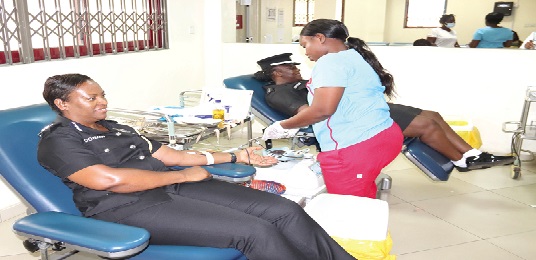
World Blood Donor Day commemorated
The country yesterday[June 14] joined the global community to commemorate this year's World Blood Donor Day, with a call on eligible persons to voluntarily donate blood to save lives.
The Ministry of Health (MoH), the World Health Organisation (WHO) and the National Blood Service (NBS) together appealed to benevolent individuals and institutions to also support blood donation exercises financially for better health delivery outcomes.
Advertisement
The theme for the commemoration was: "Donating blood is an act of solidarity: Join the effort and save lives."
Instituted by the UN and marked every year on June 14, the day is aimed at raising awareness of the importance of blood and blood products, the need for safe blood and how each individual, aged 17 to 60, can donate blood voluntarily to save lives.
At the event, regular unpaid donors and other stakeholders were acknowledged and honoured for their life-saving gift of blood.
Target
At a public education forum to commemorate the day in Accra, the acting Head of the Southern Zonal Blood Centre of the NBS, Dr Dilys John-Teye, said the service aimed at achieving 100 per cent voluntary or unpaid blood donation.
She said currently, unpaid blood donation was below 40 per cent, a situation which required prompt response by stakeholders, particularly the public.
“The target of 100 per cent is achievable if, as citizens, we accept that voluntary blood donation is a duty and civic responsibility.
“Every healthy person between 17 and 60 can donate blood after going through a simple medical screening exercise," Dr John-Teye added.
Importance
The Minister of Health, Kwaku Agyeman-Manu, in a speech read on his behalf, said the importance of blood in saving the lives of victims in emergency situations could not be overemphasised.
“As we strive to ensure blood safety and availability, some of the things we must guard against is wastage, perennial blood shortages and unnecessary and unsafe transfusion practices by healthcare providers,” he said.

According to him, unnecessary and unsafe transfusion practices exposed patients to the risk of serious adverse reactions and the transfusion of transmissible infections, adding that such acts also reduced the availability of blood products, thereby affecting healthcare delivery.
“The WHO has recommended the development of systems, such as hospital transfusion committees and haemovigilance, to monitor and improve the safety of transfusion processes,” he said, and urged the NBS to set up such monitoring mechanisms.
The Country Representative of the WHO, Dr Francis Kasolo, in a speech read on his behalf, said safe blood and its transfusion were key to quality health care of patients, including mothers bleeding during childbirth and children suffering from anaemia during malaria and malnutrition.
He said others were victims of trauma, emergency, disasters and accidents.
“The need for blood is universal, but access to blood for those who need it is a challenge, especially because blood can only be stored for a limited time,” he said.
Writer’s email: [email protected]



